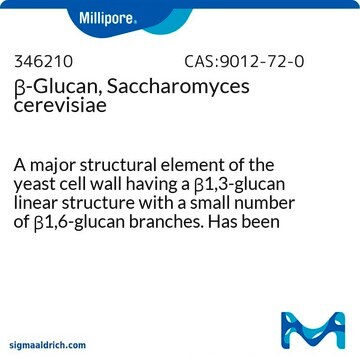67138
β-(1→3)-D-Glucanase from Helix pomatia
≥0.2 U/mg
Se connecterpour consulter vos tarifs contractuels et ceux de votre entreprise/organisme
About This Item
Produits recommandés
Source biologique
Helix pomatia
Forme
powder
Activité spécifique
≥0.2 U/mg
Température de stockage
−20°C
Vous recherchez des produits similaires ? Visite Guide de comparaison des produits
Catégories apparentées
Application
β-(1→3)-D-Glucanase from is used to digest β -1,3-glucan, which is a major component of cell walls. β-(1→3)-D-Glucanase from Helix pomatia has been used fto digest the cell walls of C. albicans .
Actions biochimiques/physiologiques
Deletion of the C.albicans histidine kinase gene (CHK1) improves recognition by phagocytes through an increased exposure of cell wall b-1,3-glucans, which are readily digested by β-(1→3)-D-Glucanases .
Conditionnement
Bottomless glass bottle. Contents are inside inserted fused cone.
Définition de l'unité
One unit corresponds to the amount of enzyme which liberates 1 μmol of glucose from laminarin (Cat. No. 61340) per minute at pH 5.0 and 37 °C
Mention d'avertissement
Danger
Mentions de danger
Conseils de prudence
Classification des risques
Resp. Sens. 1
Code de la classe de stockage
11 - Combustible Solids
Classe de danger pour l'eau (WGK)
WGK 1
Point d'éclair (°F)
Not applicable
Point d'éclair (°C)
Not applicable
Certificats d'analyse (COA)
Recherchez un Certificats d'analyse (COA) en saisissant le numéro de lot du produit. Les numéros de lot figurent sur l'étiquette du produit après les mots "Lot" ou "Batch".
Déjà en possession de ce produit ?
Retrouvez la documentation relative aux produits que vous avez récemment achetés dans la Bibliothèque de documents.
Les clients ont également consulté
Feng Duan et al.
Sheng wu gong cheng xue bao = Chinese journal of biotechnology, 27(7), 1092-1099 (2011-10-25)
In order to explore the influence of reaction temperature on the product composition, the effect of continuous temperature change (22 degrees C-60 degrees C, +/-0.1 degree C) on hydrolysis of yeast beta-glucan by endo-beta-1,3-glucanase was determined by using self-developed Biochem-temperature
Poonam Gautam et al.
Mycopathologia, 172(5), 331-346 (2011-07-15)
Artemisinin, an antimalarial drug, and its derivatives are reported to have antifungal activity against some fungi. We report its antifungal activity against Aspergillus fumigatus (A. fumigatus), a pathogenic filamentous fungus responsible for allergic and invasive aspergillosis in humans, and its
Nina Klippel et al.
Microbiology (Reading, England), 156(Pt 11), 3432-3444 (2010-08-07)
The pathogenic fungus Candida albicans is able to cover its most potent proinflammatory cell wall molecules, the β-glucans, underneath a dense mannan layer, so that the pathogen becomes partly invisible for immune cells such as phagocytes. As the C. albicans
Marián Mazáň et al.
The Biochemical journal, 438(2), 275-282 (2011-06-10)
BGTs [β-(1,3)-glucanosyltransglycosylases; EC 2.4.1.-] of the GH72 (family 72 of glycosylhydrolases) are GPI (glycosylphosphatidylinositol)-anchored proteins that play an important role in the biogenesis of fungal cell walls. They randomly cleave glycosidic linkages in β-(1,3)-glucan chains and ligate the polysaccharide portions
Yoichi Tanabe et al.
Biochimica et biophysica acta, 1814(12), 1713-1719 (2011-10-08)
An endo-1,3-β-glucanase was purified from Tunicase®, a crude enzyme preparation from Cellulosimicrobium cellulans DK-1, and determined to be a 383-residue protein (Ala1-Leu383), comprising a catalytic domain of the glycoside hydrolase family 16 and a C-terminal carbohydrate-binding module family 13. The
Notre équipe de scientifiques dispose d'une expérience dans tous les secteurs de la recherche, notamment en sciences de la vie, science des matériaux, synthèse chimique, chromatographie, analyse et dans de nombreux autres domaines..
Contacter notre Service technique










